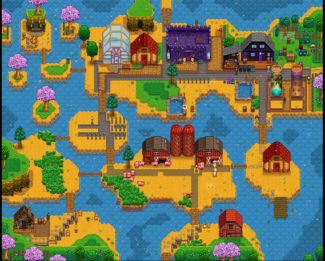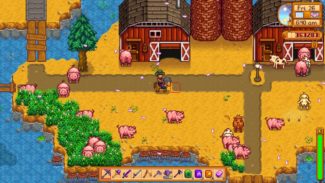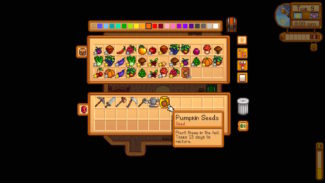Bastion
LQ: 9.15
Recommended Age: 10+
Skills Used: Planning, Working Memory, Mathematics, Reading
 Stardew Valley is a life simulation game where the player inherits an old rundown farm from their grandfather. They move to the farm and, over the course of many years, plant crops, raise animals, befriend villagers, accomplish tasks/quests, and explore dungeons. The game is split into four seasons consisting of 28 days, meaning that time to do certain activities like planting and harvesting are limited to what season the player is currently in. Upgrading or renovating your farm requires the player to earn money through the selling of their crops, the raising of animals, foraging, and completing tasks from the other villagers in town. The player can also give gifts to the various villagers to befriend them, marry them, and eventually settle down and start a family.
Stardew Valley is a life simulation game where the player inherits an old rundown farm from their grandfather. They move to the farm and, over the course of many years, plant crops, raise animals, befriend villagers, accomplish tasks/quests, and explore dungeons. The game is split into four seasons consisting of 28 days, meaning that time to do certain activities like planting and harvesting are limited to what season the player is currently in. Upgrading or renovating your farm requires the player to earn money through the selling of their crops, the raising of animals, foraging, and completing tasks from the other villagers in town. The player can also give gifts to the various villagers to befriend them, marry them, and eventually settle down and start a family.
Because of the amount of reading involved in the game, parents who have younger children might need to assist them with the dialogue portions of the game.
Organization: Arranging and coordinating materials in order to complete a task.
 Inventory management is a critical component of succeeding in Stardew Valley. The player starts with an inventory of 12 spaces and can upgrade to a maximum of 36 spaces. Because the player needs to eventually leave the farm to forage, accomplish tasks, shop for supplies, or go dungeon crawling, they need to be aware of what materials they will need before setting out. If they do not, they may run into a situation where they find a valuable item or make a purchase and have no space in which to place it. This will cause them to discard a potentially valuable item in exchange for another. The player can also build treasure chests at their home to organize and store their items, which comes in handy when needing to find an item for crafting or to accomplish a task for a villager.
Inventory management is a critical component of succeeding in Stardew Valley. The player starts with an inventory of 12 spaces and can upgrade to a maximum of 36 spaces. Because the player needs to eventually leave the farm to forage, accomplish tasks, shop for supplies, or go dungeon crawling, they need to be aware of what materials they will need before setting out. If they do not, they may run into a situation where they find a valuable item or make a purchase and have no space in which to place it. This will cause them to discard a potentially valuable item in exchange for another. The player can also build treasure chests at their home to organize and store their items, which comes in handy when needing to find an item for crafting or to accomplish a task for a villager.
Planning: Developing a systematic approach for setting and achieving goals.
 Because there is a finite amount of time in each day and in each season, the player needs to make sure that they are spending their time wisely in the game and planning out what they want to do far in advance. Certain crops will only grow in the spring or summer, and in winter nothing will grow at all, meaning the player needs to have a plan to earn money in another way. Animals in the game require food as well, meaning the player needs to have a plan for maintaining their farm animals as well. Even returning to your home on time requires the player to use their planning skills. If the player stays out until two in the morning, their character passes out and loses money and potentially valuable items. Players who struggle with planning skills should start out small and not try to accomplish too many tasks at once. Pick one or two projects to concentrate on and then work your way up to more complex tasks.
Because there is a finite amount of time in each day and in each season, the player needs to make sure that they are spending their time wisely in the game and planning out what they want to do far in advance. Certain crops will only grow in the spring or summer, and in winter nothing will grow at all, meaning the player needs to have a plan to earn money in another way. Animals in the game require food as well, meaning the player needs to have a plan for maintaining their farm animals as well. Even returning to your home on time requires the player to use their planning skills. If the player stays out until two in the morning, their character passes out and loses money and potentially valuable items. Players who struggle with planning skills should start out small and not try to accomplish too many tasks at once. Pick one or two projects to concentrate on and then work your way up to more complex tasks.
All membership plans come with full access to our entire suite of tools learning guides, and resources. Here are a few of the ones we think you’ll like the most: